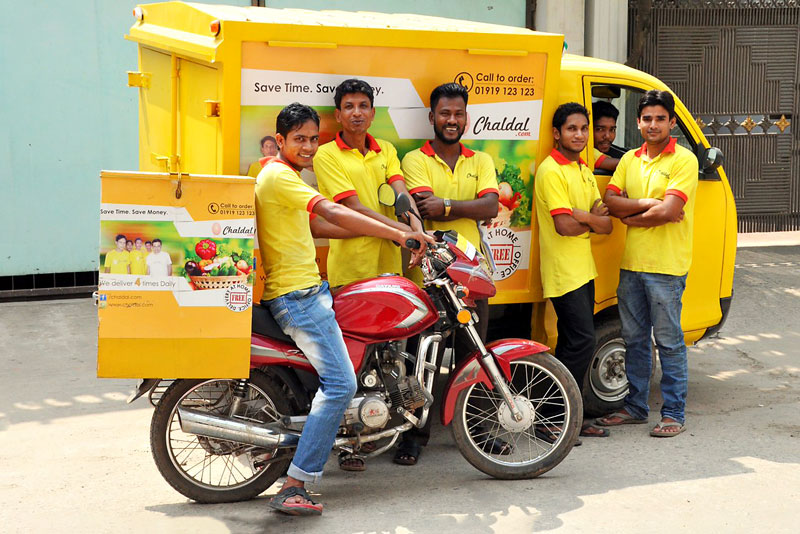Rice, eggs, coffee, and cooking oil top the grocery lists of many Bangladeshis. But for people in crowded cities like Dhaka, getting to and from the store is often more time-consuming than the shopping itself. Dhaka is one of the most densely populated cities in the world, and investment in infrastructure has not kept pace with population growth—leading to heavy traffic congestion and limited parking. This makes it difficult for consumers to purchase the food staples they need.
Entrepreneurs Waseem Alim, Zia Ashraf, and Tejas Viswanath started Chaldal, an online grocery platform in Bangladesh, to make shopping easier. Until Chaldal launched in 2013, Bangladeshis chose from among traditional grocery outlets that often failed to provide consumers with affordable, convenient access to a full range of products. Chaldal enables customers to buy a range of high-quality groceries, food, and other consumer goods like diapers at affordable prices online—and then delivers them to the buyer’s door.
Chaldal is one of the largest e-commerce companies in Bangladesh and the only online grocery platform that has achieved meaningful scale. Its success is significant because e-commerce presents an opportunity for consolidation and professionalization of the country’s fragmented grocery supply chain. This could result in better incomes for farmers, reduced wastage, and improved food safety practices.
Chaldal has already received venture capital from several investors, and in 2018 IFC invested $3 million to help the company continue to expand. IFC is partnering in this investment with IDLC Finance Limited, the largest non-bank financial institution in Bangladesh and a long-standing IFC client. Around 2,000 jobs will be created—mostly of them for low-skilled workers who often struggle to find jobs in the formal sector.
IFC’s funding also signals to investors the viability of venture investing in Bangladesh—ultimately attracting additional capital to the market. In time, this will support the expansion of other digital businesses in a range of sectors.
An Online Market that Delivers
For Dhaka’s residents, Chaldal has already become ubiquitous. More than 50,000 households and 200 business customers subscribe to the service, and the company delivers more than 2,000 orders per day. The company’s end-to-end platform incorporates route and delivery logistics planning as well as fulfillment—and that’s what makes it unique. By tapping its nine “micro-warehouses” and tailored supply chains, it’s able to deliver groceries—including fruits, vegetables, meat, and dairy—within an hour. Customers place orders through Chaldal’s mobile app or the web.
With the new capital, Chaldal will build nano-warehouses—spaces small enough that the products within them can be shelved and distributed via several robotic arms. Chaldal plans to run about 50 nano-warehouses in several target cities in and beyond Asia, which will enable the company to fulfill orders in about 15 minutes.

Getting the Goods to Consumers
Inventory management is just one factor in the delivery equation. The company transports goods via its ridesharing spinoff, Chalao, an Uber-like motorbike service, and Gogo Bangla, a logistics and delivery company. Across all of its subsidiaries, Chaldal has created 620 jobs in three countries—the U.S., Singapore, and Bangladesh.
Chaldal’s in-house delivery system is an essential part of its business model, allowing the company to ensure a smooth customer experience, especially in contrast to companies that might use third-party vendors to deliver orders. This approach has proven its value: 89 percent of revenue comes from recurring customers.
Chaldal’s commitment to this in-house delivery model benefits its Bangladeshi employees as well. Since all delivery workers are salaried, a monthly income is guaranteed.
Join the conversation: #IFCimpact
Published in August 2019
